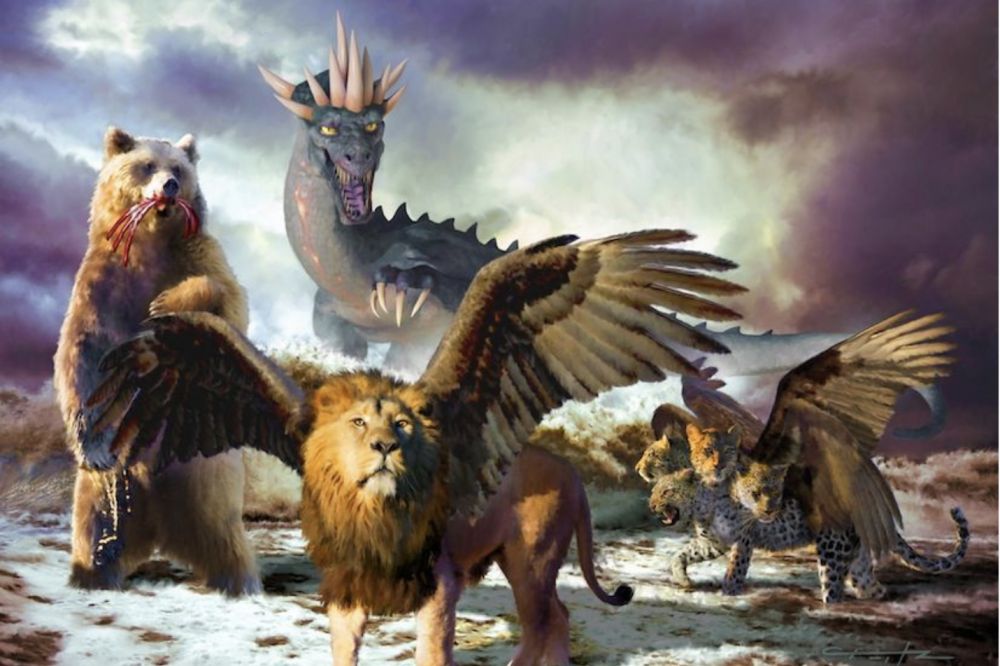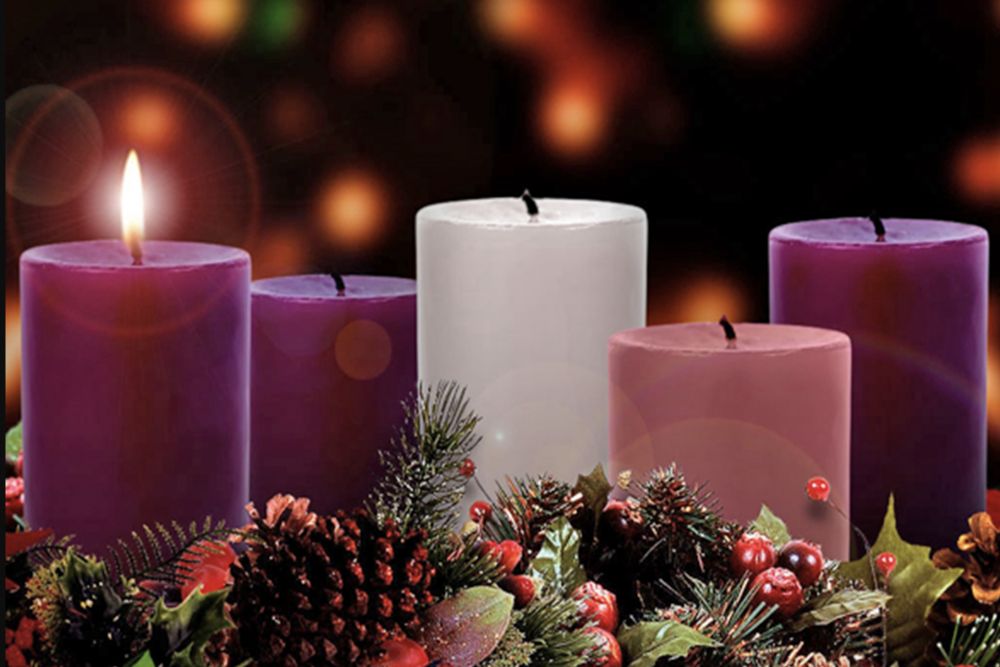
'The Little Apocalypse' A Sermon for the First Sunday of Advent
The sermon for the Holy Communion service on the First Sunday of Advent on the 3rd of December 2023.
Rachael Brind-Surch takes us on an adventure in Space and Time as she explores what an apocalypse is and why we need prophets.
The readings she is reflecting on are:
Sermon
Here we are at the start of another church year,
The start of Advent.
During Advent we watch and wait,
as we learn about the coming of a cosmic being.
A being outside of space and time,
who comes to us in human form.
We will witness their journey
and their less-than-mundane entry into the world.
We will learn from their wisdom,
and their remarkable way of being with us.
Their fixing broken communities and broken hearts.
We will meet their travelling companions
And bear witness to their courage,
Their convictions and their message of peace
We will see how they come to save the world,
Even if that costs them everything
Even their life
And then my friends,
We will witness their resurrection.
-
I am, of course, talking about the return of Doctor Who!
Have we got any Whovians in the building?
* Some hands go up *
Thank goodness or that could have been a really awkward 10 minutes.

In recent years we have had to wait the entirety of Advent to enjoy the Doctor Who Christmas special.
However, this year, thanks to the show's 60th anniversary.
We have all been treated to some extra adventures in time and space.
And boy has the excitement been built up!
For months we have been treated to sneak peeks of David Tennant's second appearance in the Tardis through the marvellous marketing invention known as the teaser trailer. These snippets act as clues as to what we can expect from the wider story when we finally get to see the show in full.
It builds interest and intrigues us.
If you are not t a fan and know nothing about it - it might seem like people are speaking another language, that it’s all a bit odd and well… alien to you. I'm not even a little bit sorry.
But for the real hardcore nerds and Whovians, this is a chance to speculate. They will start referencing older episodes in the fandom, checking out the archives and listening to interviews with the writers to seek to understand more. There will be predictions about what is going to happen. Some get it right, some get it completely wrong, but until we see the actual show we can’t know for sure who is right.
Often we want to know how a story ends because that makes us feel smart and gives us a bit of control, but we also don’t like spoilers!
We want the excitement, the mystery! The anticipation!

Our Gospel passage today is something of a teaser trailer too. It’s taken from a section of the Gospel of Mark which is also seen in some form in both the gospels of Matthew and Luke and it is sometimes known as ‘the Little Apocalypse’. Which sounds precious doesn’t it?
'Aww the little apocalypse!'
Admittedly it sounds less cute if you associate the word apocalypse with the end of the world. But, the word apocalypse in the bible doesn’t mean that. It means to uncover or reveal. So, an apocalypse is where the true nature of something is shown.
It is God pulling back the curtain to give their messengers a sneak peek of their divine perspective. These snippets act as clues as to what we can expect from the wider story when we finally get to see God's plan in full. It builds interest and intrigues us.
Most of what we call apocalyptic writing in the Hebrew scriptures and the New Testament are recorded visions and dreams by Prophets, God’s messengers on earth. Prophets like Daniel, who is the chap best known for avoiding becoming a lion snack. But he was also a dreamer of prophetic dreams in Babylon during Israel's exile. A lot of the weird stuff in our gospel reading today is taken from the writings about Daniel and is later mentioned again in the very last book of the bible.
Or there is the prophet Isaiah, who we heard from in our first reading and we will hear more from him over the Christmas period, as he shares his vision of hope for all the nation of Israel.
Because these prophetic apocalyptic writings are recorded dreams and visions they can seem incredibly odd, with lots of imagery and symbols which would have made much more sense to people living in the time of those prophets and create scenes which frankly would not be too out of place in a science fiction show.

Today’s little Apocalypse is no exception. In this passage alone we have days of suffering, falling stars, earthquakes, angels, a legendary coming of a mythic figure ‘the Son of Man’. A sprouting fig tree acts as an alarm clock, telling us the time is here but then there is also a warning we won’t possibly know the time is here and because we can’t know the time a command to simply stay awake.
When we are confronted with passages like this some people may get confused and so switch off and push it away. It can all feel so completely alien to us. Dreams and visions throughout scripture need interpreters and so the real bible nerds, the theologians and the scholars, however, get to work and speculate.
They will start referencing older passages in the bible and checking out the original Greek sources and Jewish symbolism. They will look at history to learn more about the writers of the text to seek to understand more. There will be predictions about what is going to happen. Some get it right, some get it completely wrong, and whilst we may find some arguments more convincing than others, until we see the very end we can’t know for sure who has the right answers.
In the case of this little apocalypse, some think that it is alluding to the end of the world and Jesus’ second coming, and that could well be the case, however, the brightest bible nerds of our time now tend towards the belief that this is a warning about the destruction of the temple, a shattering, world-ending loss to an occupied Jewish community under Roman rule. It is a foretelling of a promised Messiah, who will bring an end to this oppression.
The fact that the temple was indeed destroyed about 70 years after Jesus' death therefore helped to solidify Jesus’ status as the Messiah within the early church and prove that his and God's other promises of hope for the nation of Israel and all the rest of creation were true. It is a call to the followers of Jesus to keep the faith under the toughest of situations and in the face of uncertainty. Taking proactive steps to ensure each day is lived well and to not be caught in a compromised state.
I often hesitate to make sweeping generalisations about our gloriously varied congregation but I think it’s fair to say that we are not first-century Jews living under Roman occupation, so what then does that mean for us, sat here today, probably wishing this sermon had fewer prophecies and far less Who based content.
What on earth are the lectionary writers thinking putting this at the start of Advent?
It doesn’t feel very Christmassy! Where is Mary? Where is Joseph? Where even is the wee donkey? Is this all we get? Some chat about fig trees and a cryptic promise of better?
Well, I sadly don’t get to compile the lectionary so I can’t speak for them, but I can tell you what I think!
It can be amazing to get nerdy about these obscure passages. We live in a scary world and sometimes we want to know how the story ends because that gives us a bit of control. But if we are not careful, Advent becomes just another familiar season where we end up going through the motions, thinking we have all the answers. When really, we only have snippets. Only God holds the full script and whilst that can be maddening, I think there is a lesson in letting go, without complacency.
I also think that it can be understandable to want to not touch these verses with a barge pole and make a beeline for the slightly less chewy verses of Christmas, but then we miss out on all the texture and mystery, we rob a little of the punch and the power and turn a roaring lion into a pussy cat. All our scripture is layered and complex, designed and crafted. A series of writings from history designed to speak through time and space to different cultures and situations and we get more from it when we engage more with it, again remembering that it’s not about completing it or being the brightest or having the rights answers - but about deepening our relationship with God, our neighbour and our own identity as Christians.

Each Advent we start by lighting the first candle of our Advent wreath.
It can represent several things. In our service sheets, you may have clicked that we use it to recall the matriarchs and patriarchs of Israel. However in other traditions, the first candle is called the prophesy candle, and in other traditions still, it stands for hope.
Perhaps that is because the apocalyptic messages of the prophets and the prophetic visions speak not just to the historic people of Israel, but also to us.
The radical messages of the prophets and Jesus resist a slow slide into Christmas or a neatly packaged gift box of answers. They invite us to wrestle with them.
But they are also filled with hope. The hope of what is to come.
They are a teaser for something we have never seen before, full of possibility and eager invitations to interpretation, anticipation and embracing of the ineffable.
And that hope is sorely needed!
We may not all be oppressed in the same way the writer of Marks's first audience was, but we are still human followers of Christ, existing in a world ruled by powerful institutions and arrogant and dehumanising structures. A world where deep injustices flourish and radical oppression is felt in unnoticed and unpublicised ways.
We live in a world where a week of ceasefire has once more given way to destruction and violence not 100 miles from where Jesus foretold unspeakable loss for his people.
We live in a world in need of prophetic voices, who are willing to peer behind the curtain to glimpse God’s hope for their people.
It is by showing us God’s heavenly perspective, that these texts can give us hope,
or challenge us to make a change!
As we move through December I pray that the wild, rich, challenging imagery of Isaiah
and the radical message of the Gospels
and the words of Jesus,
will challenge you afresh this Advent season.
Amen.
